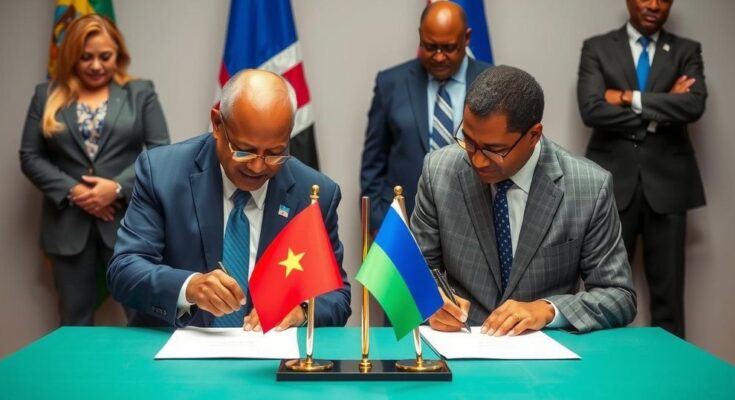Haiti and Benin have signed a five-year memorandum to enhance diplomatic ties, focusing on cooperation in security, education, culture, and scientific research. While troop deployment was not explicitly mentioned, future collaborations may emerge. This partnership raises questions about Haiti’s potential alignment with African nations post-restoration.
On Wednesday, Haiti and Benin formalized a historic memorandum aimed at enhancing diplomatic relations and political cooperation across various international spheres. The signing took place in Cotonou, with representatives from CARICOM and Benin’s foreign ministry coming together under the theme “strengthening bilateral ties and promoting Pan-African and Caribbean relations.” Haiti’s Foreign Minister, Jean-Victor Harvel Jean-Baptiste, ratified the memorandum, which will remain in effect for five years, with the possibility of renewal.
This partnership is designed to facilitate collaboration in crucial areas such as security, education, culture, diplomacy, and scientific research. The agreement has been well-received by Haiti’s foreign ministry, which emphasized that it embodies the shared aspirations of both nations. Alongside the memorandum, CARICOM and Benin officials also initiated a visa waiver agreement to streamline travel between the Caribbean and Benin, fostering closer ties between the regions.
While the current memorandum does not explicitly discuss troop deployments, its focus on security might hint at potential military cooperation in the future. Notably, Benin has previously announced intentions to contribute troops as part of a multinational effort to combat gang violence in Haiti, aligning with a broader mission led by Kenya with United Nations support. As of early 2025, Benin has yet to mobilize its forces due to logistical challenges and ongoing internal deliberations. Meanwhile, a current multinational force in Haiti comprises personnel from various nations, including Kenya and Jamaica. Future discussions aim to reinforce support for Haiti’s security initiatives.
The memorandum encourages thought regarding Haiti’s future allegiances, particularly whether it may favor alignment with African nations rather than its Caribbean neighbors once stability is achieved. This relationship could signify a pivotal shift in diplomatic interactions, enhancing Haiti’s role on the international stage.
The recent memorandum between Haiti and Benin reflects a significant step towards the enhancement of diplomatic relations and cooperation amid pressing international challenges. Haiti, facing internal security crises exacerbated by gang violence, seeks support through alliances that encompass various domains including military, educational, and scientific collaborations. The prospect of Benin’s troop deployment illustrates a growing commitment to address security issues collaboratively, with multiple nations involved in peacekeeping efforts. The historical and cultural ties between Africa and the Caribbean serve to further contextualize this partnership, emphasizing areas of mutual interest and shared heritage.
In summary, the memorandum between Haiti and Benin represents a crucial advancement in diplomatic relations, establishing a framework for cooperation on multiple fronts. While troop deployments are not immediately specified, the focus on security suggests a potential pathway for future military assistance. The alignment of Haiti with African nations could lead to a significant geopolitical shift, impacting its international relationships in the years to come.
Original Source: www.thestkittsnevisobserver.com




